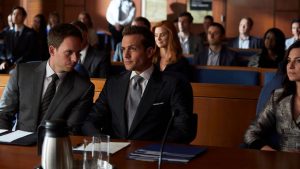Usually, when reviewing the USA legal drama Suits, I try to come up with some cohesive theme to tie together my thoughts (typically criticisms) of the show’s recent episodes. But when analyzing the end of this past half-season – which ended last night – I don’t have much insight except that this season of Suits has not been particularly good (this review will contain spoilers up through last night’s mid-season finale).
The last two episodes have introduced a new foil for Harvey Specter – Andrew Malick (Usman Ally, best known to me as Mohammad Al Jafar on Veep), a prosecutor who has recently made a name for himself bringing down big Wall Street defendants. Mike Ross believes that Harvey needs a victory and the best way to do that would be to beat Malick. So Mike gets the firm hired by a defendant who is in Malick’s crosshairs. But unbeknownst to Harvey and Mike, Malick has a personal vendetta against Harvey, stemming from their time together working for the government. Malick was jealous of Harvey when they worked together, and believed that Harvey was successful because he sucked up to their boss, whereas Malick did not get enough respect despite working extremely hard. Proving Malick’s point, Harvey does not even remember Malick, and is left flat-footed after Harvey and Mike confront Malick (at Malick’s gym for some reason).
This is an odd storyline. Despite apparently harboring a grudge against Harvey for all these years, it’s not like Malick actually did anything about it. Harvey and Mike were the ones who confronted Malick, after being retained to defend someone who was already being targeted by Malick. If Harvey and Mike had not been hired by that client, they never would have even crossed paths with Malick, meaning that Malick wouldn’t have even been able to get revenge.
Furthermore, Malick’s method of revenge is of questionable legality. He plants a newspaper story suggesting that Harvey’s client wrote a memo directing the illegal sale of her company (which he gives to Harvey and Mike the night before publication – either Malick is from Early Edition and gets his newspaper in advance or the newspaper has a crazy early deadline). When Harvey protests to the judge that there is no such memo, Malick argues that Harvey once destroyed evidence, and must have done it again. Amazingly, the judge goes along with Malick’s argument, stating that “old dogs don’t learn new tricks” (which apparently is a viable legal doctrine now) and holding that if Malick can prove that Harvey once destroyed evidence, the newspaper article would lead to an inference that Harvey had done so again and that the memo exists.
I have not done any independent research, but this seems like an absurdly thin basis to permit such an inference, particularly one that could land Harvey’s client in prison. It is not like Harvey is some two-bit unethical lawyer who has been found guilty in the past of multiple ethics violations; he is the managing partner at a major New York law firm. How can this judge possibly let Malick inquire as to Harvey’s prior evidence destruction based solely on Malick’s say-so?
Malick’s claims become even more questionable when he subpoenas Donna for testimony. It turns out that Malick’s evidence is that Donna once shredded a memo. But Donna isn’t an attorney working on this case. Malick is essentially arguing that because one of Harvey’s colleagues once allegedly destroyed evidence, he must have destroyed evidence in this case. Amazingly, the judge goes along with it.
I don’t think I’ve written at all this season about Rachel Zane, which is illustrative of the fact that the show has absolutely no clue what to do with her. She spent part of the season (correctly) angry at Mike for secretly sticking with his pro bono prison case even though he was conflicted out and agreed to drop the case. Now, she is working with her father Robert Zane in a pro bono case against a predatory lender accused of discriminatory policies adversely affecting people of color.
But Suits being Suits, there is always an ulterior motive. This time, Robert has a personal vendetta against the CEO of the company because he sexually harassed Robert’s sister when she worked for him many years ago. I’ve complained about this before, but why can’t things just be what they seem? Robert and Rachel going after a predatory lender is a perfectly fine storyline; not everything lawyers do is because of some (usually personal) ulterior motive. On the other hand, the casting director did an amazing job finding an actor to play a young Wendell Pierce.
In fact, it turns out that there is no evidence that the company engaged in predatory lending. Robert just used that as a pretense to sue the company and get revenge on the CEO (but wait, where did Robert and Rachel find over 100 plaintiffs for their non-meritorious predatory lending lawsuit?). Robert and Rachel argue that because the CEO has a pattern of sexual harassment, the company must have engaged in predatory lending, an argument that the judge buys (what is with these gullible judges in this show?).
I am not particularly confident in an improvement over the second half of the season, especially after the ending of last night’s episode, in which Donna kisses Harvey. After all, as a wise judge once ruled, old dogs don’t learn new tricks.
Harry Graff is a litigation associate at a firm, but he spends days wishing that he was writing about film, television, literature, and pop culture instead of writing briefs. If there is a law-related movie, television show, book, or any other form of media that you would like Harry Graff to discuss, he can be reached at [email protected]. Be sure to follow Harry Graff on Twitter at @harrygraff19.


